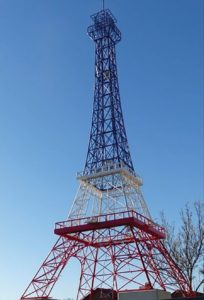WELLFLEET — Chef Philippe Rispoli loves to collect artwork and display it in his PB Boulangerie Bistro at the corner of Lecount Hollow Road and Route 6.

Copper pieces he started to collect when he was just 15 can be found hanging in his restaurant’s dining room. Sculptures, paintings, and maps, many of which came from his native France, are also on display there. And plates celebrating different restaurants hang from the ceiling in the main entryway.
“Creating ambience with the collection of artwork is both personally important to Philippe and part of the aesthetic he continues to create at PB,” said Eliza Cox, Rispoli’s life partner, last week.
But Rispoli’s plan to display a 21-foot replica of the Eiffel Tower in front of his restaurant was not well received by local officials, so it has remained stored in three pieces for the last four years, much to Rispoli’s frustration.
Rispoli purchased the replica in France from the metal artist who created it, and he had it shipped by container to the U.S.
Excited to share his latest acquisition, he submitted an application to the zoning board of appeals in March 2020 for a special permit and two variances that would allow him to place the tower in front of the restaurant.
Right from the start, there was a difference of opinion.
The ZBA determined that the Eiffel Tower replica was a sign — a French symbol to advertise a French restaurant. Cox, who is a partner in the law firm Nutter McClennen & Fish and represented Rispoli at the ZBA hearings, argued that it was a structure, not a sign, since it had no lettering, logos, or banners, according to the minutes of the hearing.
One zoning board member argued something could be considered an art object as well as a sign.
Classified as a sign, the tower would not meet the criteria for the required special permit and two variances, Cox said.
Because of the shape of the lot and the presence of nearby wetlands, the front area of the property was the only place Rispoli could put the tower, said Cox. It would therefore qualify for a variance due to hardship, she said.
Sharon Inger, who chairs the ZBA, told Cox that variances are for people who have difficulties locating a house on their property. She didn’t believe the tower qualified as a structure within the meaning of the town’s bylaws. And not having the Eiffel Tower on the property did not constitute a hardship.
The zoning board unanimously denied all three requests, sticking to its characterization of the tower as a sign. It was too large in terms of square footage, too tall at just under 28 feet including its base, and too much of an encroachment on the property’s front area.
“What made me sad is that the town discriminated,” Rispoli said last week. “The town needs to understand I’m not a politician. A guy like me is putting all my money into the place, and the way they treat me is racist.”
Rispoli appealed the zoning board’s denial in Orleans District Court. Included with the appeal were photos of several other businesses in Wellfleet whose front areas displayed large objects that apparently weren’t prohibited by the town, including a large foghorn, wood pilings, a mooring ball, buoys, anchors, and stacked lobster traps.
After the case languished at the district court for two years, the judge ruled in April that the tower was in fact a structure and not a sign, but he upheld the zoning board’s permit denial.
There was some buzz at town hall that Rispoli might return with a plan to erect the tower elsewhere on his property, since he had that right under the court’s decision. He dispelled those rumors last week.
Rispoli simply has to wait another two years, he said. In 2024, he plans to reconstruct part of the building and will incorporate the Eiffel Tower replica into the design.
His hard feelings over the town’s position remain, however.
“What they did was an insult to me,” said Rispoli. “I’ve been here for 13 years, and they’ve never said a good thing about this place. It makes me feel like they are saying ‘Go away.’ ”



